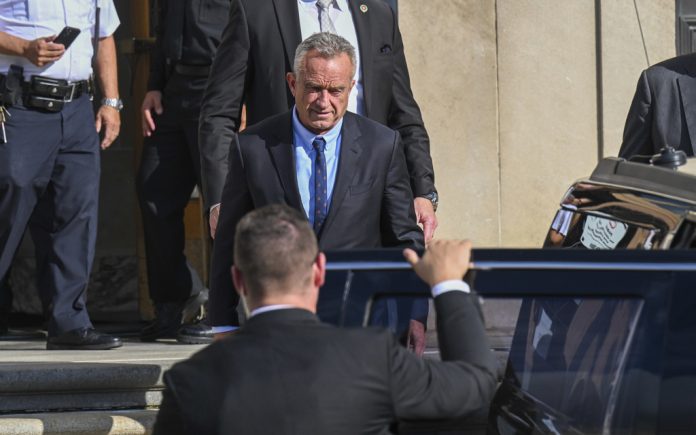ALBANY, N.Y. (AP) — A judge ruled Monday that independent presidential candidate Robert F. Kennedy Jr. falsely claimed a New York residence on nominating petitions, invalidating the documents he needs to appear on the ballot in the state.
Judge Christina Ryba’s ruling after a short trial in state court is expected to be appealed. If upheld, it would keep Kennedy off the ballot in New York and could lead to challenges in other states where he used an address in New York City’s suburbs to gather signatures.
The lawsuit backed by a Democrat-aligned political action committee claims Kennedy’s state nominating petition falsely listed a residence in well-to-do Katonah while actually living in the Los Angeles area since 2014, when he married “Curb Your Enthusiasm” actor Cheryl Hines.
Kennedy argued during the trial that he has lifelong ties to New York and intends to move back.
During the trial, which ran for less than four days, Kennedy maintained that he began living in New York when he was 10 and that he currently rents a room in a friend’s home in Katonah, about 40 miles (65 kilometers) north of midtown Manhattan. However, Kennedy testified that he has only slept in that room once due to his constant campaign travel.
The 70-year-old candidate testified that his move to California a decade ago was so he could be with his wife, and that he always planned to return to New York, where he is registered to vote.
Barbara Moss, who rents the room to Kennedy, testified that he pays her $500 a month. But she acknowledged there is no written lease and that Kennedy’s first payment wasn’t made until after the New York Post published a story casting doubt on Kennedy’s claim that he lived at that address.
The judge also heard from a longtime friend of Kennedy’s who said the candidate had regularly been an overnight guest at his own Westchester home from 2014 through 2017, but was not a tenant there as Kennedy had claimed.
Attorneys representing several New York voters grilled Kennedy in often heated exchanges as they sought to make their case, pointing to government documents including a federal statement of candidacy with a California address, and even a social media video in which Kennedy talks about training ravens at his Los Angeles home.
Kennedy has the potential to do better than any independent presidential candidate in decades thanks to his famous name and a loyal base. Both Democrat and Republican strategists have expressed concerns that he could affect their candidate’s chances.
Kennedy’s campaign has said he has enough signatures to qualify in a majority of states, but his ballot drive has faced challenges and lawsuits in several, including North Carolina and New Jersey.
Clear Choice, a super PAC, filed the New York suit on behalf of several voters in the state.
Kennedy told reporters last week that getting knocked off the ballot in New York could lead to lawsuits in other states where his campaign listed the same address.
After the trial ended Thursday, Kennedy argued that people who signed his petitions deserve a chance to vote for him.
“Those Americans want to see me on the ballot. They want to have a choice,” he said.
Source: post





